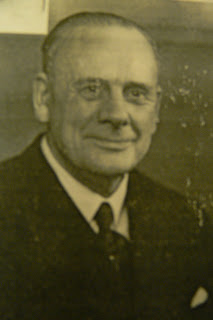William
Hammer, formerly known as William Hind, had taken over the West Cliff Theatre Clacton on Sea in 1934, also
the same year he invested in film. This is where we were to perform in the next
Summer Season. He owned a number of seaside theatres, as well as assorted
businesses, and directed the troupe Will Hammer’s Players. As a former
comedian, he had a passion for the stage and for theatre entertainment.
Reading
about him in a theatre paper, I discovered that he was born in Hammersmith,
where he still resides, it said, and took his stage name from his birthplace.
The paper went on to say that he owned 12 live theatres, mainly in seaside
towns, and was Chairman of three film companies. His other business interests
include jewellery, a business once shared with his brother until it was
divided, and four cycle shops as well as other areas of retail including barber
shops.
He
had always enjoyed cycling and had gained a couple of cycling records in his
youth. Reading on, I discovered that he was often seen organising cycle races
at dawn and his leisure time was spent playing golf or relaxing on his
property, where he has a kennel of 14 Borzois dogs and a stable of six horses.
It
was to this property that Paul and I were invited to spend a couple of weekends
during the first season of Cinderella. Will hammer was a delightful, almost shy man who took a liking to Paul and I. Members of the cast that he liked would be invited to his mansion and servants would greet us and tell us we were in the blue room or the red room and so on. It was just fantastic. He was so kind and so generous.
It was a beautiful mansion of
unbelievable luxury surrounded by manicured gardens and situated in the
country. Will Hammer also leased two mansions on the River Thames, one of which
became his premiere studios for his horror movies.
It
was also in 1934 that Will established the film company, Hammer productions,
based in a three-room suite of offices in Regent Street , London
It
was around this time that he met the Peruvian-born Argentinean, Enrique
Carreras, a former cinema owner, leading to a joint partnership and the
establishment of Exclusive Films, a film distribution company.
Hammer
produced four films between 1936 and 1937 , all distributed through Exclusive,
but soon faced bankruptcy with a slump in the British film industry. Exclusive
continued to distribute films for surviving companies.
At
the time of our involvement with Will Hammer, he’d been working successfully on
horror films. Following demobilisation, William’s son, Anthony and Enrique’s
son, James, were working with him. James had resurrected Hammer Film
Productions following World War Two with a number of short ‘fill in’ film
segments. Hammer Film Productions was thus now the film branch of Exclusive.
In
the horror genre, Hammer found overwhelming success with the film The
Quatermass Experiment in 1955, soon to be followed by its sequel,
Quatermass 2 in 1957. Between the fifties and sixties, Hammer Film Productions
was to dominate the genre with considerable financial success and backing from U.S.
Also
just prior to the time of our introduction to William Hammer, he was involved
with the film noir genre, predominantly featuring American stars. Between 1952
and 1955 Hammer Productions had produced well over a dozen films in the
category.
* * * *
 |
| Pat Hammer |
Meals
were of generous extravagance, with waiting staff to serve and whisk away our
dishes in readiness for the next course. Mornings were easy-going, with no
expectations on early rising. We made our way to the dining room, once ready,
and were greeted by a huge spread of hot and cold dishes, fresh fruit and
juice, coffee or tea.
The
days were spent languorously on the estate, spending time with Will, his wife, Pat,
and their young daughter, Susan. We walked the grounds and wondered at how life
would be to live in such grandeur and with so much beauty and space.
 |
| Susan Hammer |
On
one particular weekend at the Hammer estate, we had all lost track of time
until one of us realised that we would surely be late for curtain call. We
scurried to gather our belongings, with the help of the maid. The theatre was
some considerable distance from the estate and we were accompanied by Pat in
one of Hammer’s cars, knowing that we couldn’t make it before the understudy
was called upon to get dressed in my steed.
It
is a requirement that theatre actors must be in the theatre 30 minutes before
curtain call. If absent, the actor was replaced by an understudy. Disembarking
from the car, we high-tailed it into the theatre, racing down the corridor to
the dressing rooms. We were so late that there would barely be time for me to
dress and prepare before I had to be on the stage.
To
my dismay, my understudy was dressed and ready to go on. The stage door man, a
stickler for the rules, was ready to report us when Pat Hammer, who had
followed us in, spoke up behind us. “Joan and Paul have been our guests,” she
said, authoritatively. With that, all was restored and I made haste to be ready
in time.

No comments:
Post a Comment